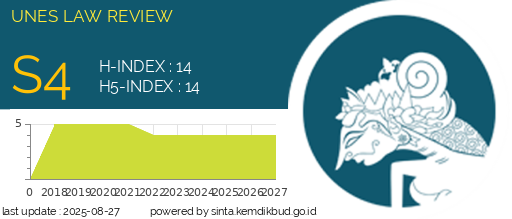KONSEP JAMINAN PERLINDUNGAN TERHADAP PENGAMBILALIHAN INVESTASI ASING BERDASARKAN HUKUM KEBIASAN INTERNASIONAL DAN IMPLEMENTASINYA DI INDONESIA
DOI:
https://doi.org/10.31933/unesrev.v5i3.448Keywords:
Foreign Capital, Investment, ExpropriationAbstract
Foreign capital has become a popular topic in the world of international business. Its presence in the recipient country is considered to bring many benefits to the country. Foreign capital can create new jobs, which can help solve the unemployment problem in the recipient country. The influx of foreign capital also brings new technologies that are not mastered by developing countries. With the influx of foreign investment, it is expected that technology that is generally controlled by developed countries can also be controlled by developing countries through the transfer of knowledge. However, the positive impacts brought by foreign capital do not always benefit the recipient country. Sometimes, foreign investment also has a negative impact on the recipient country. In the viewpoint of International Law, foreign capital needs to be protected. This aims to ensure that foreign capital can operate safely and is protected from various regulations or laws that can harm them. However, this protection should not be done without regard to human rights and the welfare of local communities. In this case, the recipient country must take appropriate measures to ensure that foreign capital companies do not violate human rights and have a positive impact on local communities. In addition, recipient countries must also ensure that they have clear and enforceable laws to protect the rights of local communities.
Downloads
References
Dolzer, R., & Schreuer, C. (2012). Principles of International Invesment Law. United Kingdom: Oxford University Press.
Republik Indonesia. Undang-Undang tentang Penanaman Modal. Undang-Undang Nomor 25 Tahun 2007. TLN Tahun 2007 Nomor 67. LN No 4724
Indonesia-Australia Comperhensive Economic Partnership Agreement. (n.d.). Retrieved from www.dfat.gov.au: https://www.dfat.gov.au/trade/agreements/in-force/iacepa/iacepa-text/Pages/iacepa-chapter-14-investment#annex-14b
Kissam, L. T., & Leach, E. K. (1959). Sovereign Expropriation of Property and Abrogation of Concession Contracts. Fordham Law Review, 28.
Losari, J. J. (2016). Comperhensive or BIT by BOT : The ACIA and Indonesa's BIT. Asian Journal of Internatioal Law, 6.
Marshall, F. (2018, Oktober 18). Siemens v. Argentina. Retrieved from www.iisd.org: https://www.iisd.org/itn/en/2018/10/18/siemens-v-argentina/
Mukthi, M. F. (2015, Agustus 28). Riwayat Masuknya Modal Asing Ke Indonesia. Retrieved Desember 12, 2022, from historia.id: https://historia.id/politik/articles/riwayat-masuknya-modal-asing-ke-indonesia-DWVy1/page/1
Newcombe, A., & Paradell, L. (2009). Law and Practice of Investment Treaties : Standards of Treatment. Alphen aan den Rijn: Kluwer Law International.
Nikièma, S. H. (2012). Best Practices Indirect Expropriation . Canada: The International Institute for Sustainable Development.
OECD. (2002). Foreign Direct Invesment for Development, Maximising Benefit, Minimising Cost. Paris: OECD Publication Service.
OECD. (2004). "Indirect Expropriation" and the "Right to Regulate" in International Investment Law (Vol. 2004/04). OECD Publishing. doi:https://doi.org/10.1787/18151957
Putra, E. H. (2017, November 4). Jangan Sampai Indonesia seperti Venezuela. Retrieved Desember 12, 2022, from mediaindonesia.com: https://mediaindonesia.com/ekonomi/130471/jangan-sampai-indonesia-seperti-venezuela
Rajaguguk, E. (2019). Hukum Investasi Penanaman Modal Asing (PMA) dan Penanaman Modal Dalam Negeri (PMDN). Depok: Rajawali Pers.
Reinisch, A. (2008). Expropriation. In P. Muchlinski, F. Ortino, & C. Schreuer , The Oxford Handbook of International Investment Law (pp. 407-458). Oxford: Oxford University Press.
Secretariat, T. A. (2015, Desember). ASEAN Comprehensive Investment Agreement A Guidebook for Businesses and Investors. Retrieved from asean.org: https://asean.org/wp-content/uploads/2020/12/ASEAN-Comprehensive-Investment-Agreement-A-Guidebook-for-Businesses-and-Investors.pdf
Shanks, R. B. (1986). Insuring Investment and Loans against Currency Incovertibility, Expropriation, and Political Violence. Hasting International and Comparative Law Review, 9.
Sihombing, J. (2009). Hukum Penanaman Modal di Indonesia. Bandung: Alumni.
Soekanto, S., & Mamudji, S. (2013). Penelitian Hukum Normatif : Suatu Tujuan Singkat. Jakarta : Raja Grafindo Persada.
Sornarajah, M. (2010). The International Law on Foreign Invesment (Third ed.). New York: Cambridge University Press.
Sunggono, B. (2022). Metode Penelitian Hukum. Jakarta: Raja Grafindo.
Syaifudin, M. (2011). Nasionalisasi Perusahaan Modal Asing : Ide Normatif Pengaturan Hukumnya dalam UU No 25 Tahun 2007 dan Relevansinya dengan Konsep Negara Hukum Kesejahteraan Pancasila dalam UUD NRI Tahun 1945. Jurnal Hukum Pembangunan, 41 No 4, 666.
The International Institute for Sustainable Development (IISD). (n.d.). A Sustainability Toolkit for Trade Negotiators: Trade and investment as vehicles for achieving the 2030 Sustainable Development Agenda. Retrieved Desember 12, 2022, from www.iisd.org: https://www.iisd.org/toolkits/sustainability-toolkit-for-trade-negotiators/about-us/#jump
Triwulandari, I. A., & Budiana, I. N. (2018). Nasionalisasi Perusahaan Penanaman Modal Asing di Indonesia. Jurnal Analis Hukum, 1 (1).
UNCTAD. (2012). Expropriation UNCTAD Series on Issues in International Invesment Agreements II. New York: United Nation.
Valuation of Expropriated Property under Investment Treaty Law- On the Distinction between Lawful and Unlawful Expropriation. (n.d.). Retrieved from www.duo.uio.no: https://www.duo.uio.no/bitstream/handle/10852/44579/7/639.pdf
Whitsitt, E. (2009, Juni 8). Waguih Elie George Siag and Clorinda Vecchi v. Arab Republic of Egypt: A Question of Nationality? Retrieved from www.iisd.org: https://www.iisd.org/itn/en/2009/06/08/waguih-elie-george-siag-and-clorinda-vecchi-v-arab-republic-of-egypt-a-question-of-nationality/
Downloads
Published
How to Cite
Issue
Section
License
Hak cipta :
Penulis yang mempublikasikan manuskripnya di jurnal ini menyetujui ketentuan berikut:
- Hak cipta pada setiap artikel adalah milik penulis.
- Penulis mengakui bahwa UNES Law Review berhak menjadi yang pertama menerbitkan dengan lisensi Creative Commons Attribution 4.0 International (Attribution 4.0 International CC BY 4.0) .
- Penulis dapat mengirimkan artikel secara terpisah, mengatur distribusi non-eksklusif manuskrip yang telah diterbitkan dalam jurnal ini ke versi lain (misalnya, dikirim ke repositori institusi penulis, publikasi ke dalam buku, dll.), dengan mengakui bahwa manuskrip telah diterbitkan pertama kali di Jurnal UNES Law Review.



















